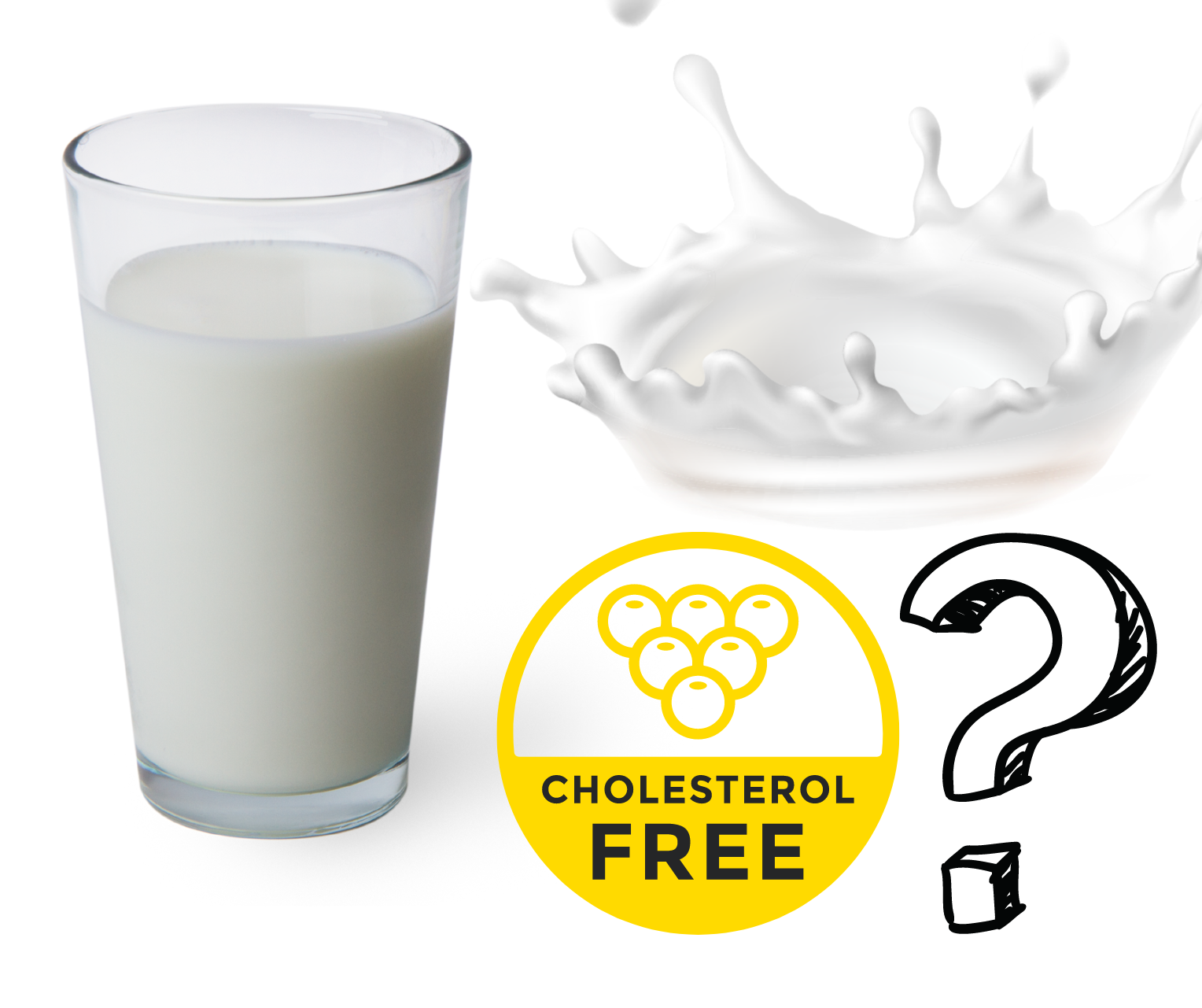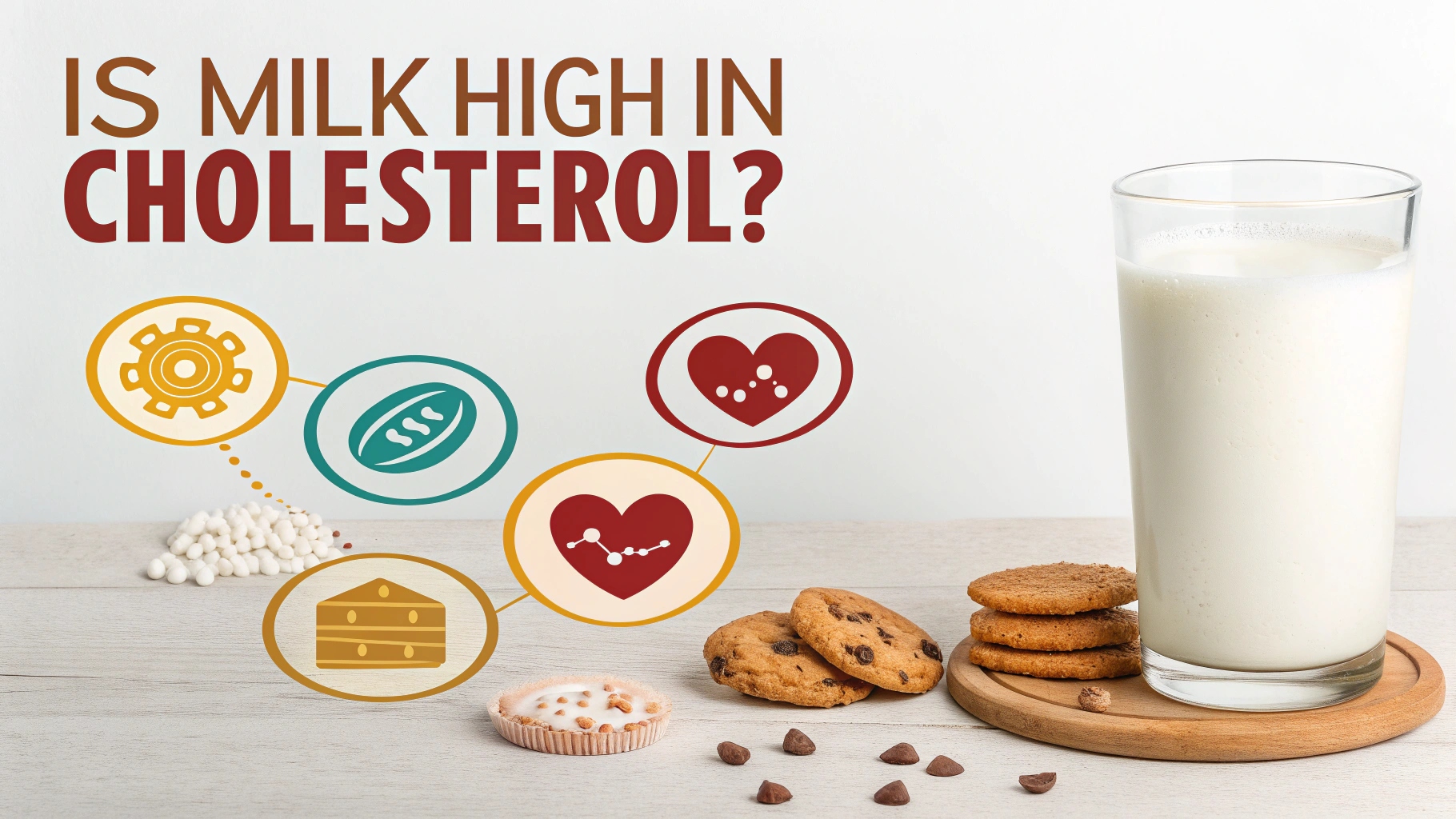Introduction: Is milk high in cholesterol? Milk is a nutritious drink, and the whole world uses it. It contains essential products like vitamins and protein that are essential to life.
It also prevents cholesterol which is fat and harmful to health. Fat is a waxy, fatty substance found in animals product. Animal meat, milk, eggs, and dairy products are their rich sources.

Table of Contents
The body uses it to form hormones and Vitamin D. It is a vital component of the cell membrane. Its excess causes heart disease and stroke.
Milk is a rich source of cholesterol, and its quantity depends upon the type of milk and its fat content. It occurs in milk-like suspended fat globules. Whole milk contains (24mg/100g) of cholesterol. Skim milk and reduced fat milk contain less amount of it.
Milk is a more significant protein, calcium, and fat source, but it is bad for cholesterol and causes heart problems. Cow milk increases the cholesterol level in the body. Coconut, oat, almond, soy, and camel milk are good for deficient cholesterol patients and gluten free.
Let’s read more is milk high in cholesterol?
Types of milk containing cholesterol
Organic Cow’s milk is a pure and rich source of protein but bad for cholesterol. One cup of whole milk contains 160 calories, 5g of fat, and 35mg of cholesterol. It provides calcium to the body.
Grass-fed dairy cows are a rich source of omega-3 than other cows, and it promotes good heart health. Cow milk increases the cholesterol level in the body.
Raw Cow milk
It is an alternative to whole milk containing the same amount of protein, cholesterol, and fat. It is also known as unpasteurized milk.
It means that it is not processed from heating to kill the pathogen and is safe for consumption. Pregnant women and children should not drink raw milk. It would harm them, making them susceptible to bacterial disease.
Raw milk puts people with low immune systems at significant risk of sickness. Cheese made from raw milk is very harmful to health. People should avoid cheese and dairy products.
Goat’s milk
Goat milk is beneficial for good health and is an excellent alternative to Cow milk. One Mug contains 168 calories, 6.5 g of saturated fat, and 27mg of cholesterol.
It has fewer amount of minerals and vitamins than Cow milk. High levels of it may cause coronary artery disease.
Camel’s milk
It is challenging to find, but it is a rich source of vitamins. One glass contains 107 calories, 3g of saturated fat, and 17 g of cholesterol. It includes 3 to 5
Percent more amount of vitamins and minerals than Cow milk. It has anti-diabetic properties because it contains insulin and insulin protein.
Soy milk
It has no cholesterol but lacks calcium. It contains only 2g of fat per cup and is suitable for people suffering from harmful cholesterol levels. The source soy milk plants have no cholesterol and less saturated fat.
It contains 7g of protein, which is good for health and reduces the risk of heart disease. Soy milk is best for lowering cholesterol.
Almond milk
It is low-protein milk and recommended for heart patients. It contains no cholesterol and saturated fat, reducing the risk of heart disease and stroke.
Per cup of almond milk contains 30-40 calories and no saturated fat. It is also obtained from plants. Thus, it has no cholesterol.
It has unsaturated fatty acid, which reduces harmful cholesterol levels and provides calcium. Unfortunately, it contains a low amount of milk, so it is not the ideal choice.
People prefer to skim or Cow milk over it. If you want to take it, you take unsweetened milk because sugar in any form is dangerous. But almond milk is best for high cholesterol.
Oat milk
It is near milk in the market and good for health. When oat and water are mixed and processed through a milling process. One cup of oat milk contains 80-85 calories and no saturated fat or cholesterol.
It has a high amount of vitamin B, which converts food into energy. It contains higher sugar carbohydrates and is better for cholesterol. It is gluten-free and a rich source of carbohydrates.
But consuming many carbohydrates( sugar) may cause diabetes. Oat milk is suitable for high cholesterol.
Coconut milk
It consists of a medium chain of fatty acids. One cup contains 45 calories, 4g of saturated fat, and no cholesterol. People who eat coconut or consume coconut milk are less compatible to heart disease.
It is a good choice for heart problems and high cholesterol risk. Coconut milk is not bad for cholesterol.
Relation between milk consumption and cholesterol level
There is an inverse relation between cholesterol and milk consumption. A higher milk intake may lower the cholesterol level and risk of heart disease but increase the fat.
Excess of everything could be better; thus, you should use milk in adequate amounts. It must be careful that milk should not contain high cholesterol levels; it should be organic.
It is because milk contains calcium which has lipase enzymes. Lipase enzyme breaks down the fat in the body and lowers the cholesterol.
Here is a 15-question FAQ section for a blog post in English titled “Is Milk High in Cholesterol? A Closer Look at Nutritional Facts and Risks,” with each question formatted as an h3 heading:
Is Milk High in Cholesterol? A Closer Look at Nutritional Facts and Risks – Your Questions Answered
Milk is a staple in many diets, but its impact on cholesterol levels is often a topic of discussion. This FAQ section aims to clarify the nutritional facts about milk and its relationship with cholesterol and overall health.
How much cholesterol is in milk?
The amount of cholesterol in milk varies depending on the fat content. Whole milk contains the most, with about 24 milligrams per cup (240ml). Reduced-fat (2%) milk has less, around 12-15 mg, and skim milk, which is virtually fat-free, contains only about 5 mg of cholesterol per cup.
Does the cholesterol in milk directly increase my blood cholesterol levels?
While milk does contain dietary cholesterol, research indicates that for most healthy people, dietary cholesterol from foods has less of an impact on blood cholesterol levels compared to saturated and trans fats. However, individual responses can vary.
Is saturated fat in milk a concern for cholesterol?
Yes, saturated fat is present in milk, particularly in higher-fat varieties like whole milk. Saturated fats have a more significant impact on raising LDL (“bad”) cholesterol levels in the blood than dietary cholesterol does for most people.
How do different types of milk compare in terms of saturated fat?
Whole milk is the highest in saturated fat. Reduced-fat (2%) milk has less saturated fat than whole milk, and skim milk has very little to none. Choosing lower-fat milk options can help reduce saturated fat intake.
What are the recommended guidelines for saturated fat intake?
Health organizations generally recommend limiting saturated fat intake to less than 10% of daily calories, and ideally, below 6% for individuals with elevated cholesterol or heart disease risk.
Beyond cholesterol and saturated fat, what other nutrients does milk provide?
Milk is a good source of essential nutrients, including calcium, vitamin D (often fortified), protein, potassium, and B vitamins like riboflavin and B12. These nutrients are important for bone health, muscle function, nerve function, and overall well-being.
How do calcium and vitamin D in milk benefit health?
Calcium is vital for building and maintaining strong bones and teeth. Vitamin D helps the body absorb calcium and also plays a role in immune function and bone health. The combination of calcium and vitamin D in fortified milk is particularly beneficial for bone health.
Are there any potential health risks associated with milk consumption besides cholesterol?
For some individuals, milk consumption can be associated with lactose intolerance, milk protein allergy, or potential links to certain conditions, although research on these links is ongoing and sometimes conflicting. The saturated fat content in higher-fat milk can also be a concern for heart health in some individuals.
Who should be particularly mindful of their milk intake due to cholesterol concerns?
Individuals with high blood cholesterol, existing heart disease, or those at increased risk for cardiovascular disease should pay closer attention to their saturated fat and cholesterol intake, and may be advised to choose low-fat or skim milk options.
Do plant-based milk alternatives contain cholesterol?
Most plant-based milk alternatives like almond milk, soy milk, oat milk, and rice milk are naturally cholesterol-free. Their saturated fat content varies depending on the specific type and brand.
Are plant-based milk alternatives nutritionally equivalent to cow’s milk?
Nutritional content varies widely among plant-based milk alternatives. Some are fortified with calcium, vitamin D, and other nutrients to be comparable to cow’s milk, while others may have different nutritional profiles. Checking the nutrition labels is important.
Can drinking milk be part of a heart-healthy diet?
Yes, unsweetened milk, yogurt, and cheese can be part of a heart-healthy dietary pattern. Choosing lower-fat options is generally recommended for individuals managing cholesterol levels.
Does the way milk is processed affect its cholesterol content?
The primary factor affecting cholesterol content in milk is the amount of fat present, which is determined during processing (e.g., removing fat to create reduced-fat or skim milk). Pasteurization and other processing methods do not significantly alter the cholesterol content.
If I have high cholesterol, do I need to avoid all dairy products?
Not necessarily. While high-fat dairy products can contribute to saturated fat intake, lower-fat milk, yogurt, and some cheeses can still be included in a cholesterol-conscious diet as part of an overall healthy eating pattern. Consulting with a healthcare provider or a registered dietitian is recommended for personalized advice.
What is the overall takeaway regarding milk and cholesterol?
While whole milk contains cholesterol and saturated fat that can impact blood cholesterol levels for some individuals, lower-fat milk options are low in cholesterol and saturated fat. Milk provides valuable nutrients, and its role in a healthy diet depends on individual health needs, risk factors, and overall dietary pattern.
Final word: Is milk high in cholesterol?
Milk is an excellent nutritional beverage rich in vitamins, minerals, and fats. It is a good resort of calcium and protein. Whole milk, if Cows, is a rich source of calories, saturated fats, and cholesterol.
High cholesterol causes cardiac disease and stroke. Raw milk from cows is not suitable for expected women and children. It may affect their life and cause foodborne sickness. Raw milk is unsafe and contains bacteria that cause illness.
While camel milk is a more rich source of vitamins and minerals than Cow’s milk, it is a unique and high-calorie-containing drink. Goat milk is good for health but has low miners and vitamins than Cow’s milk.
Milk obtained from plant products is down or has no cholesterol. Plants milk includes coconuts, almonds, soy, and oat milk.
These are rich sources of calcium, magnesium, carbohydrates, vitamins, and protein and are suitable for high-cholesterol patients. Milk is high in cholesterol, and Consuming whole milk causes lousy cholesterol.
Also read: Does Whisky Affect Your Cholesterol Levels?; Benefits of Cheese during Pregnancy; Is Burrata cheese healthy?
- Is Milk High in Cholesterol? A Closer Look at Nutritional Facts and Risks (1) - April 26, 2025
- Cheese pregnant pasteurized: Preventing Foodborne Illness (1) - April 26, 2025
- What percentage of women get breast cancer? (1) - April 26, 2025
